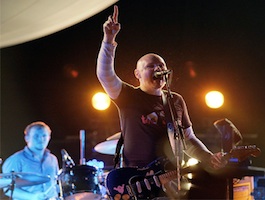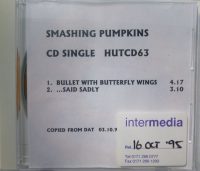Article by: SPfreaks
Article by guest writer Annie S. Alejo
Photo by Magic Liwanag
 Billy Corgan says he grew up around a lot of Filipinos. His fans here, meanwhile, have waited nearly two decades to see him and his band The Smashing Pumpkins in the flesh.
Billy Corgan says he grew up around a lot of Filipinos. His fans here, meanwhile, have waited nearly two decades to see him and his band The Smashing Pumpkins in the flesh.
MANILA, Philippines – Billy Corgan could not have come to Manila at a worse time. Twenty years late, by his own sheepish admission, the horrible weather that greeted them here would be a real test to The Smashing Pumpkins front man’s resolve, as well as that of his many fans that had waited this long for him to be here.
With torrential rains sucked in by a monsoon on its merry, destructive way to China, large parts of Metro Manila ended up submerged in water on their second day here. After their mid-day press con on Monday, Aug. 6, and with daytime sky as bleak as dusk by Tuesday, Corgan and company spend Day 2 working with the local promoters—and, presumably, with people waiting for them on their next stop—to push the concert back one day.
Corgan would later tweet an announcement moving the concert to Wednesday, Aug. 8, ending his posts with, “SP has the best fans in the world and we didn’t want anyone taking any chances. Manila you are worth the wait to US. Lots of love/be safe.” He spends some of his free time on that dreary day in the mall beside his hotel, tweeting “ZOMBIE MALL” on account of most shops being closed.
It seemed an odd time for rock n’ roll considering the suffering and destruction wrought by this non-typhoon. But it could not have been more rock n’ roll either—a band defiantly putting out a show despite the worst possible weather conditions for fans that are willing to risk it all to spit in the face of chance. Though worth it, the artist and his fans would wait no longer.
An ocean away
The Smashing Pumpkins’ latest album is called “Oceania.” When you call up images on the web, they would reveal the Pacific Ocean and countries like Australia, New Zealand, Malaysia and the Philippines, among others. In The Smashing Pumpkins terms, it would only be a part of a massive 44-song undertaking collectively known as “Teargarden by Kaleidyscope.”
“I was going through a difficult time in my life… There was this, a personal sense of alienation in love and in life,” Corgan says about the inspiration for the album. The sense of separation brought about by modern day trappings would also figure in his thought and writing process. “Here I am in the Philippines, texting people in Thailand, France… I’m connected to friends all over the world, which is incredible, yet we don’t talk on the telephone. There’s this weird kind of, you feel connected but you also feel a little bit more isolated.”
“Oceania” is hailed as Corgan’s return to form. “It’s probably the best-reviewed album I’ve ever had, which is strange because I’ve probably made better albums. It’s weird to make an album that you knew was great, like ‘Siamese Dream,’ and it got a lot of bad reviews at that time; and now it’s considered a classic… It’s been a long time since I’ve had that—probably about 15 years. I’ve had to hear every album how I’m stupid and dumb and I don’t know what I’m doing. So it’s nice to know I’m not stupid and dumb.”
In his most recent shows, including the one in Manila, he and the band would play the entire album instead of pandering to the greatest hits mindset. “Why? ‘Cause you need it. You need ‘Oceania.’ I can see it in your eyes,” he jokes at the press conference. At the concert, while fans cheered the loudest for older hits like “Today” and “Bullet With Butterfly Wings,” and grew wild for “Tonight Tonight” and “Disarm,” they turned a reverential ear to the newer “Oceania” songs, including two of Corgan’s alternating favorites, “Pale Horse” and the album’s title track.
The future of rock
“I have some of the most difficult and intelligent fans in the world… and I’m lucky sometimes, and sometimes not so lucky in that,” Corgan says. But while he understands the need of long-time fans to hold on to their idea of The Smashing Pumpkins and their music, he notes, “They forget the 16-year-old, the 20-year old… this is their time. ‘Oceania’ is their album, for their time. Now, if they connect with it, great; if they don’t, they don’t. [But] don’t try to always come in and steal that away from the next generation. Because that’s why we’re here, we love our fans… But without the young fans, there is no future to Smashing Pumpkins. We can’t run an oldies business; not only is it boring, it’s actually not a very good business.”
The nasty consequence of the art-as-business paradigm isn’t lost on Corgan, who has always struggled for integrity in the face of shifting musical tastes and endless parade of flavor-of-the-months. “The music industry essentially operates on a dumbing down principle—how dumb do we have to go to sell this record to the most [number] of people. And the more intelligent and articulate it is, you lose a certain degree of audience.”
He adds, “For the most part, the charts are dominated by music that’s essentially… repetitive [in] melody, style, tone, texture, message because it reaches the most [number] of people.”
Thus, his highly conceptual “Teargarden” album made in what he says is the “tradition of music”—in essence, inspiring others and lifting them up to be creators themselves—is his public battle with failure. “I’m willing to fail. Most artists are not willing to fail; they want their failures to happen behind the scenes because they don’t want to be criticized. I’m okay with being criticized because I think that the journey is really valuable. There’s a lot of people out there who get that,” he says. “It’s amazing, if you let people be with you on a deeper journey, they’ll actually figure it out.”
Rock n’ roll and Pinoy values
Aside from his high-regard to music fans in general, Corgan’s own set of values runs deep and curiously parallel to ours. “I grew up around a lot of Filipinos in the outskirts of Chicago where the family rules,” he shares. “There’s always that uncle or that Grandpa—he knows what the hell is going on, you know? That’s where the real wisdom lies.”
He adds, “You have to listen to that. You can’t dumb your family down. You can’t dumb your community down. You can’t dumb your country down. You can’t dumb your fans down. I think I’m at a point now where I don’t wanna be dumbed down anymore. I just think that’s the worst thing for rock n’ roll.”
Growing up with Filipino friends—“Some of my best friends now are Filipino,” he adds—his visit here may be a long time coming but it holds great meaning to him. “It’s always humbling if you go to a place I already have a respect for the culture.”
He adds, “I’m embarrassed it’s taken that long. It’s nothing that I did. Honestly… this business is always difficult; if somebody doesn’t wanna bring you here or if they wanna pay you five bucks and stick you in a dirty club, you know what I mean? You gotta come the right way; so finally we’re here, under the right circumstances.” Freak weather occurrences notwithstanding.
Although he says The Smashing Pumpkins have “made a lot of people a lot of money by just being weird,” their many years in this fickle business have allowed them to see the shifts in the value system. Where the value of artists is quantified by how many records they sell or if they get on radio or MTV, and where, once, the business loves “alternative” music because it’s made people money, somehow the music—and artists like Corgan—still survives because it matters to the people that listen.
In all the years of being critically panned to being hailed as champions of marketing genres, to simply being laid on the wayside for not being “cool enough” or “alternative enough,” or even not sociable enough, Corgan knows a deeper truth. “What The Smashing Pumpkins means as a band is so much more valuable; what we mean to people is so much more valuable than our commercial value,” he says.
He is right. The band’s Manila fans that braved the rains and floods certainly proved that. Calling them “old school fans” of The Smashing Pumpkins during the show, their riotous reception could only have come from what Corgan himself always strives for—connecting with people emotionally.




Leave a Reply